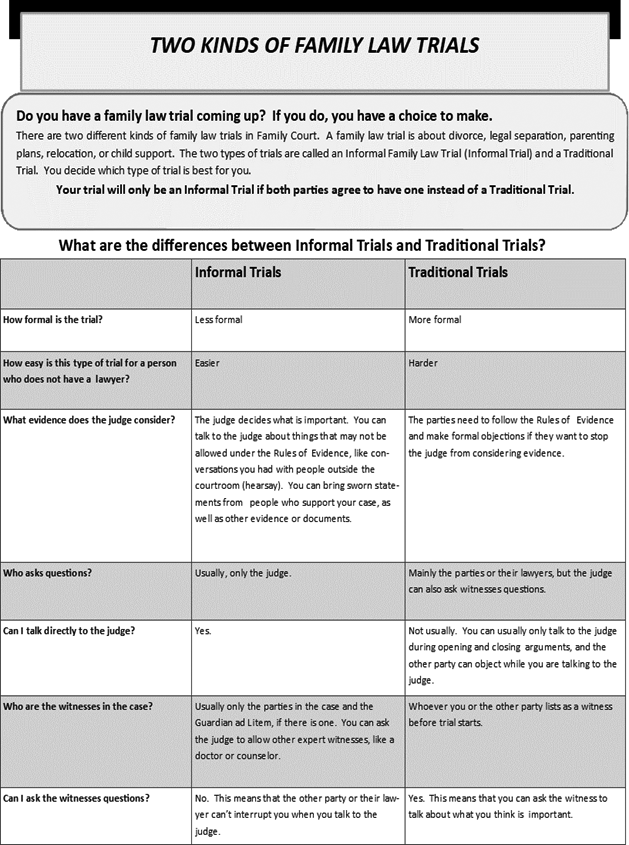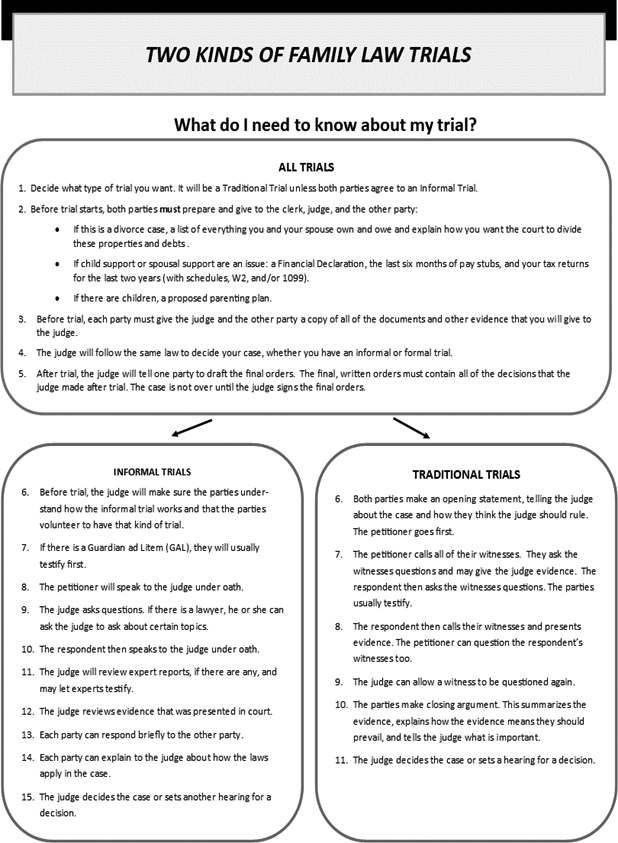WSR 22-23-096
RULES OF COURT
STATE SUPREME COURT
[November 14, 2022]
IN THE MATTER OF THE PROPOSED NEW GENERAL RULE [GR 40]—INFORMAL FAMILY LAW TRIALS [REVISED PROPOSAL] | ) ) ) ) | ORDER NO. 25700-A-1478 |
An ad hoc workgroup, including D.C. Cronin, having recommended the adoption of the proposed new General Rule [GR 40]—Informal Family Law Trials [Revised Proposal], and the Court having considered the new general rule, and having determined that the new general rule will aid in the prompt and orderly administration of justice;
Now, therefore, it is hereby
ordered:
(a) That the new general rule as shown below is adopted.
(b) That the new general rule will be published in the Washington Reports and will become effective January 1, 2023.
dated at Olympia, Washington this 14th day of November, 2022.
| | Gonzalez, C.J. |
Johnson, J. | | Gordon McCloud, J. |
Madsen, J. | | Yu, J. |
Owens, J. | | Montoya-Lewis, J. |
Stephens, J. | | Whitener, J. |
GR 40
INFORMAL FAMILY LAW TRIALS (IFLT)
[NEW]
(1) Upon the consent of both parties and with approval of the court, Informal Family Law Trials (IFLT) may be held to resolve any or all issues in original actions or modification for dissolution of marriage, separate maintenance, invalidity, child support, parenting plans, residential schedules, relocation, child custody, and other family law matters as established by statute.
(2) The parties may select an IFLT within 30 days before trial or trial setting if no trial date is set at filing, or as otherwise directed by local court rule. Parties must file a "Trial Process Selection" and Waiver for IFLT that is in substantial compliance with the attached model form. This form shall be accepted by all superior courts, but may be modified to conform to local rule practices, provided local rule practices do not nullify this rule and/or the implementation of this rule.
(3) When a trial is conducted pursuant to this rule, in accordance with ordinary trial management, the trial judge shall retain discretion to modify any of these procedures as justice and fundamental fairness require, with prior notice to the parties.
(a) At the beginning of an IFLT, the parties will be asked to affirm that they understand the rules and procedures of the IFLT process, they are consenting to this process freely and voluntarily, and they have not been threatened or promised anything for agreeing to the IFLT process. Parties must affirm that they waive the right to appeal the court's use of the IFLT process and the court's admission of evidence pursuant to the IFLT process that is not consistent with the traditional court process, court rules, and Rules of Evidence. However, nothing in this rule prevents a party from filing a direct appeal of any final judgment or order at the conclusion of the IFLT.
(b) The court may ask the parties or their lawyers for a brief summary of the issues to be decided.
(c) The moving party will be allowed to address the court under oath concerning all issues in dispute. A represented party is not questioned by their counsel, but may be questioned by the court to develop evidence required by any statute or rule; for example, the applicable requirements of the Washington State Child Support Schedule if child support is at issue. A party may also present up to five declarations (limited to 20 pages total) from laypersons who would otherwise be called as witnesses.
(d) The parties will not be subject to cross-examination unless permitted by the court. However, the court will ask the nonmoving party or their counsel whether there are any other areas the party wishes the court to inquire about. The court will inquire into these areas if requested and if relevant to an issue to be decided by the court.
(e) The process in subsections (3)(c) and (3)(d) is then repeated for the other party.
(f) Expert reports will be received as exhibits. Upon request of either party, the expert will be sworn and subjected to questioning by counsel, the parties, or the court.
(g) The Rules of Evidence shall not apply to the proceedings. The judicial officer hearing the matter shall determine the credibility and weight of the evidence that is offered.
(h) The court shall receive and admit exhibits offered by the parties. The court will determine what weight, if any, is given to each exhibit. The court may order the record to be supplemented. The process for submitting, filing, and storing exhibits shall be governed by local rule.
(i) The parties or their counsel shall then be offered the opportunity to respond briefly to the statements of the other party.
(j) The parties or their counsel shall be offered the opportunity to make a brief legal argument.
(k) At the conclusion of the case, the court shall make its ruling or may take the matter under advisement, and make every effort to issue prompt rulings no later than the 90-day statutory requirement. Findings shall be made and orders entered consistent with statutes and case law.
(l) The court may modify these trial procedures as justice and fundamental fairness requires.
(4) The court may refuse to allow the parties to utilize the IFLT, or a party who has previously agreed to proceed with an IFLT may file a motion to opt out of the IFLT at any time, including after an IFLT has started but before a ruling has been issued.
(a) If the parties request an IFLT after a traditional trial has started, the court should consider whether enforcement of traditional trial rules after the IFLT has started will prejudice either party or the best interests of any child. The decision to continue with a traditional trial shall be left to the discretion of the judicial officer hearing the matter.
(b) A change in the type of trial to be held may result in a change of the trial date.
Superior Court ofWashington County of_____
|
In re: Petitioner/s (person/s who started this case) | No. |
________________________
And Respondent/s (other party/parties) ______________________ |
Family Law Informal Trial Selection (FLITS)Clerks Action Required |
|
Family Law Informal Trial Selection
Use this form if you want an Informal Trial instead of a Traditional Trial. You must file this form 30 days before the trial date (or trial setting if no trial date is scheduled).
Here are some of the differences between the two types of trials:
| |
| • | In a Traditional Trial, both parties are allowed to call witnesses and to cross-examine the opposing witnesses. The Rules of Evidence apply. |
| |
| • | In an Informal Trial the judge, not the parties, questions the witnesses. Other than the parties, only expert witnesses are allowed. The Rules of Evidence do not apply. Instead, the process follows General Rule 40. |
I have reviewed the Two Kinds of Family Law Trial brochure attached to this form.
1. I want an Informal Trial. I am the (check one)
[ ] Petitioner [ ] Respondent
I understand that if the other party does not agree to an Informal Trial, we will have a Traditional Trial.
2. I understand than an Informal Trial works like this:
| |
| • | Both parties will give a brief summary of the issues that need to be decided. Both parties will speak to the judge under oath about the issues in the case (examples: how to divide property and debt, parenting plan, child support, spousal support). |
| |
| • | Both parties will have an opportunity to respond to the other party's statement and explain how the law applies to their case. |
| |
| • | There is no cross examination. The judge may ask questions. |
| |
| • | Most of the time, the two people in the case are the only witnesses in an Informal Trial. Sometimes a party needs an expert witness (someone with special training and education) to give an opinion, which is allowed in informal trials. The parties or their lawyers may ask experts questions. The expert's report will be received as an exhibit. |
| |
| • | Non-expert witnesses are not allowed. Instead, each party may submit up to 5 declarations from other people with a maximum page count of 20 pages. Also, each party can submit any document or other evidence they want the judge to review. |
| |
| • | The judge will decide what credibility and weight to give documents, physical evidence, and testimony that is entered as evidence during the Informal Trial. The judge is not bound by the Rules of Evidence. |
| |
| • | The judge will follow the same law to decide the case, whether it is an Informal or Traditional Trial. |
3. Expert witnesses(check one)
[ ] I do not want an evaluator or other expert witness to testify at my trial.
[ ] I want an evaluator (CASA, GAL or FCS) to be a witness at my trial.
[ ] I want another type of expert to testify at my trial. (Name)_____________________ has expertise in _________________________ and has information relevant to my case.
[ ] I have filed the report they prepared for my case.
4. I give up my right to a Traditional Trial
By agreeing to an Informal Trial, I agree to the following:
| |
| • | Voluntary. My participation in an Informal Trial is strictly voluntary. No one can force me to agree to this process. I have not been threatened or promised anything for agreeing to an Informal Trial. |
| |
| • | Format. The normal question and answer format of trial will not be used. The judge may ask me questions about the case. The other party and I can both tell the judge anything we feel is relevant. |
| |
| • | Rules. The Rules of Evidence will not apply in this Informal Trial. I will follow the procedures of GR 40, the rule on Informal Family Law Trials. |
| |
| • | Evidence. Neither party will call any witnesses except for experts. |
| |
| • | No appeal of the process. I give up my right to appeal the judge's use of the Informal Family Law Trial process. I still have a right to appeal the final decision. |
Signed on (date) ________________________.
______________________ ___________________________
Signature Printed Name



